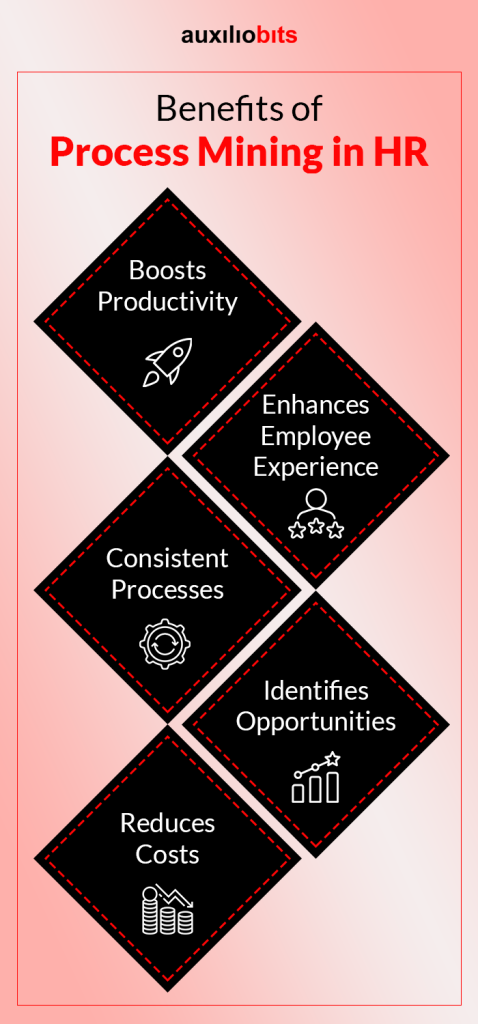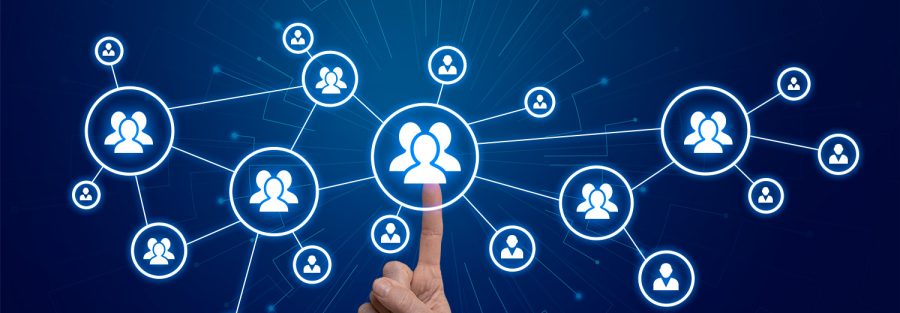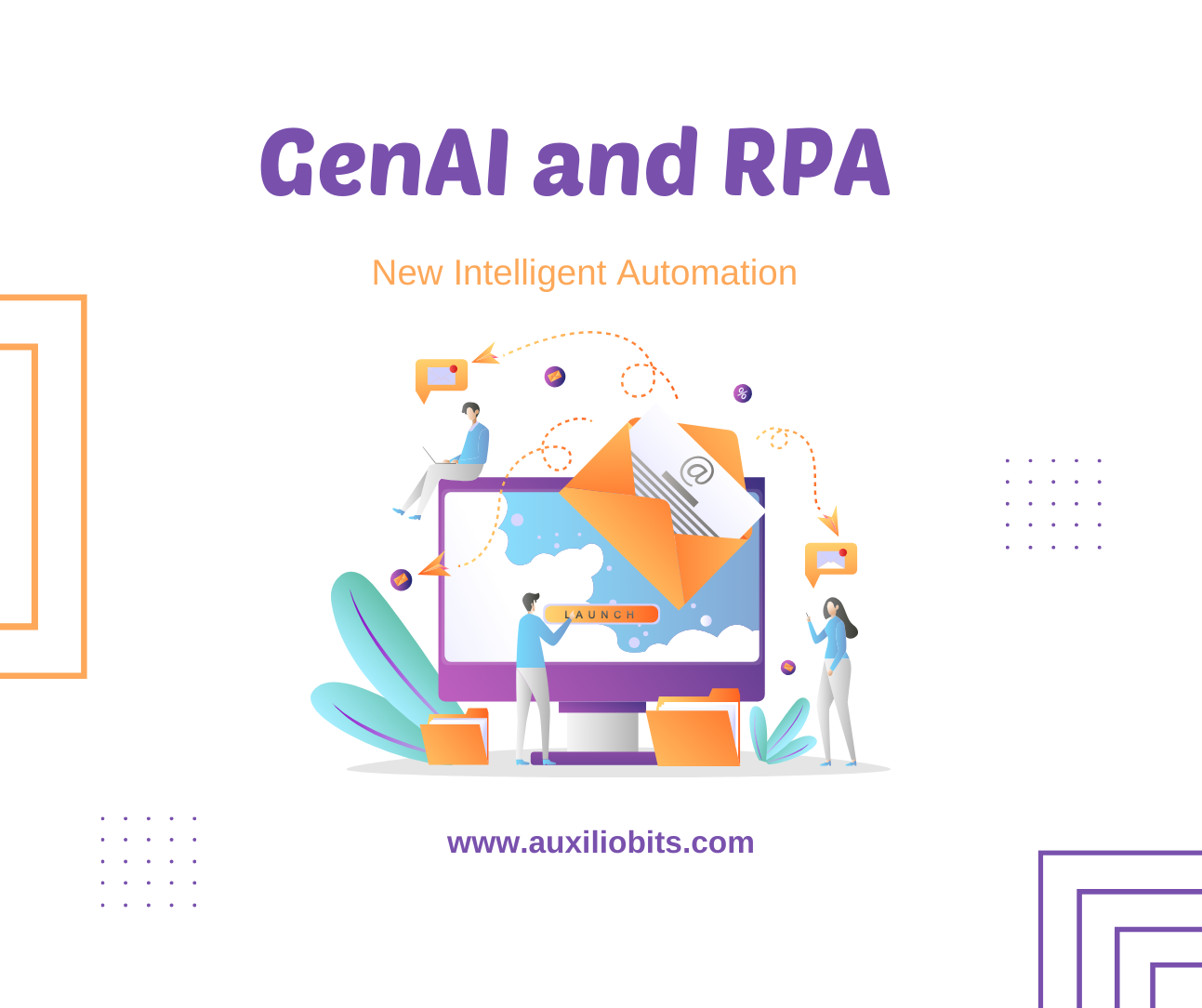Key takeways
- Process mining is a technique that analyzes how different processes work, identifies bottlenecks, and suggests improvements.
- It is imperative now, more than ever before, to streamline the HR processes by identifying the bottlenecks and enhancing their efficacy.
- The Human Resources department has a complex network of processes that need to function in tandem. Enhancing HR processes is imperative for boosting the performance of different departments and the organization as a whole.
- Process mining optimizes different HR processes and provides enhancements that reduce cycle times and improve efficiency. It offers multiple benefits to HR teams which boosts the overall efficacy of the organization.
We generally associate process mining with process intensive sectors like manufacturing, healthcare, etc. This is because it pertains to enhancements in manual and automated processes in these sectors.
But is it relevant for Human Resource Management (HRM) as well?
One might feel that process mining might not be relevant to HR practices because it is people-based and not process based!
However, process mining has made inroads in HR and boosting efficiency in more ways than one.
Let’s deep dive into the relevance of process mining in HR!
What is Process Mining?
Businesses use several tools to optimize processes to boost efficiency and reduce costs. However, these tools lack the ability to identify process changes and improvements. They cannot assess the operational and strategic factors of a process.
Process mining is a technique that analyzes how different processes work, identifies bottlenecks, and suggests improvements. It includes techniques for analysis of operational processes based on event logs extracted from company’s databases. Process mining facilitates proactive analysis of process performance and reporting.
It analyzes current condition of processes by leveraging real-time data. It provides factual insights to optimize a process by eliminating redundancies and reducing unnecessary steps.
These aspects of process mining have made it popular across industries. Data reveals that the projected process mining market is expected to reach USD 10.03 billion by 2028. (Source: Zipdo)
How Process Mining Works?
A process model or process graph is created with the help data gathered from IT systems like ERP, CRM, etc. Digital Twin is one of the technologies used especially in manufacturing to visualize a process in real-time.
The end-to-end process is examined through this model to identify any variations in the process-flow.
Variations observed are outlined. AI algorithms provide insights into the deviations.
The algorithms and visualizations help determine if the process is functioning as intended or not.
If the process is not functioning as desired, it is optimized with the necessary resources to enhance it. Robotic Process Automation (RPA) is used to boost efficiency, and reduce cycle times of processes.
Why Process Mining is Relevant for HR?
Process mining has become relevant for HR in recent times because of the changing landscape of the domain. During the pandemic and post pandemic, the work culture has shifted to remote or hybrid work culture. As such, HR processes have undergone a sea of change. It is imperative now, more than ever before, to streamline the HR processes by identifying the bottlenecks and enhancing their efficacy.
The HR department in any organization has a vital role to play because it provides different departments with the right talent and is responsible for retaining that talent. It is also responsible for several processes that pertain to employee experience.
The Human Resources department has a complex network of processes that need to function in tandem. Enhancing HR processes is imperative for boosting the performance of different departments and the organization as a whole.
Some of the HR functions include recruitment, compensation and benefits, employee engagement, succession planning, and more. Each of these functions has different processes. For instance, the recruitment function includes processes like application tracking, interviewing, assessments, employee onboarding, and more. Similarly other functions also have their specific set of processes.
HR also requires interactions between various internal and external stakeholders for processes like document drafting, master data management, and more.
While automation tools boost the efficiency of the processes, it is possible that the process itself might not be functioning as desired. This could increase the costs and cause delays. Since the HR workflow includes multiple processes, each of those processes need to be monitored. Hence, process mining is extremely relevant for the HR workflow.
Process mining tools indicate the time taken by different process steps, the bottlenecks, and instances of unexpectedly longer wait times. They also identify unexpected redundancies. Process mining brings in transparency in the processes. It highlights causes for deviations such as errors in the system or inadequate communication between stakeholders, etc.
Process mining helps HRM to generate new and accurate reference models and it compares the live process with the reference models. It helps enhance employee experience and optimize overall HR policies and strategies. It helps HR teams to boost their long-term strategies like onboarding, developing opportunities for employee growth, optimizing reimbursement strategies, and more.
Process mining paves the way for data-based communications and more efficient systems.
Process Mining Use Cases in HR
The HR department in an organization performs several functions. Let us look at some specific HR functions where process mining has a role to play:
Recruitment
The recruitment process entails several processes including filtering candidate applications, organizing interviews and skill assessments, job offers, communicating with candidates, employee onboarding, etc. Each of these processes has a specific sequence and cycle time. Delays or inefficiencies in any one of the processes can impact candidate experience negatively. It can also delay the hiring process.
Process mining helps HR teams to identify the speed at which each process is executed and optimize it. HR professionals can also analyze the reasons for candidate drops outs through process mining.
Document Generation
HR is one department that generates substantial volumes of documents such as contracts, etc. Document generation is a time-consuming and intensive process. It includes process such as creation of documents, inputting signatures, documentation of correspondence, and other related tasks. HR teams expend a lot of time and energy in performing these processes.
Process mining in document generation offers insights into aspects such as the responsible personnel, dates and duration of documents, individual and tasks involved, etc. This data enables HR professionals to optimize document generation process so that it is faster and more efficient.
Query Management
HR departments in organizations are flooded with queries from multiple sources. It could be the managers looking to fulfill their hiring needs, employees who may have queries about their compensation or any other reason, queries from potential candidates, and more efficient.
Process mining helps analyze the efficiency of the query management process. It provides insights into how HR answers the inquiries, responsible personnel for addressing the queries, etc. These insights about the query management process helps HR professionals to boost their query management process leading to better outcomes and enhancing employee experience.
Employee Benefit Schemes
The HR department rolls out benefit schemes to attract candidates and employees to various positions in the organization.
Process mining provides insights on aspects such as benefits choices, relevance and effectiveness of the offered benefits, efficiency of enrollment process, and more. These insights help HR teams to enhance the benefits schemes for a better employee experience.
Benefits of Process Mining in HR
Boosts Productivity
Process mining tools reveal new ways to execute HR processes by overcoming the bottlenecks. The HR teams can, therefore, achieve more in less time. RPA bots take over routine tasks and relieve HR professionals for skilled tasks. The collaborative efforts of man and machine enhance productivity.

Enhances Employee Experience
While the benefits of process mining to a business are many, it greatly enhances employee experience. This is because the speed of various processes increases, reducing wait times. This is especially relevant in areas such as resolving employee queries, etc. Process mining also takes over redundant tasks so that employees can work on tasks that require human intelligence. This motivates employees to make a difference..
Consistent Processes
Process mining provides a clear picture of the process in real-time which makes the model more accurate and consistent. It also provides insights into exceptions and highlights errors, and more. These insights empower HR teams to rely less on intuition and more on data thereby leading to informed decisions.
Identifies Opportunities
Since process mining works with any system that creates event logs, it can reveal hidden opportunities that might have been missed earlier. HR teams can identify underutilized positions and employees and leverage them productively. Once business processes are aligned with how the real people in the organization work, employees are more likely to be committed to their tasks and contribute to the growth of the business.
Reduces Costs
Process mining minimizes errors, reduces wastage of time, provides valuable insights, and reduces inefficiencies in HR processes. These aspects reduce the costs and overheads in the HR department. Besides, HR teams can focus on activities that boost employee experience.
Want to experience these benefits of process mining and more for your business?
Then you will need the best process mining tools!
There are several vendors who provide process mining software and choosing the best one can be like for looking for a needle in the haystack!
Let us make it simple for you!
One of the leading consultants the help businesses optimize their processes is Auxiliobits!
We have a professional team that has provided process mining solutions for multiple clients across sectors. Our experts have an in-depth knowledge of process mining technology. We work with our clients to identify the processes where the technology can be effectively deployed. Our team vets the vendors and recommends cost-effective solutions that meet the needs of our clients.
Connect with our experts Now to boost the efficiency of your processes.
Final Takeaway
Process mining has a proven track record for fixing real-world problems efficiently and cost-effectively driving value for businesses. These factors help create a better work environment for employees. Besides it also reduces resolution times making employees happier.
HR teams have a lot on their plates and they have to manage several processes. Inefficiency in any of the HR processes not only impacts the HR department but also leaves its footprint on the entire organization. Process mining comes as a ray of hope for the HR department where it reduces errors and cycle times and enhances the efficacy of HR processes. The consequence is happy employees and happy HR professionals.




 July 19, 2024
July 19, 2024
